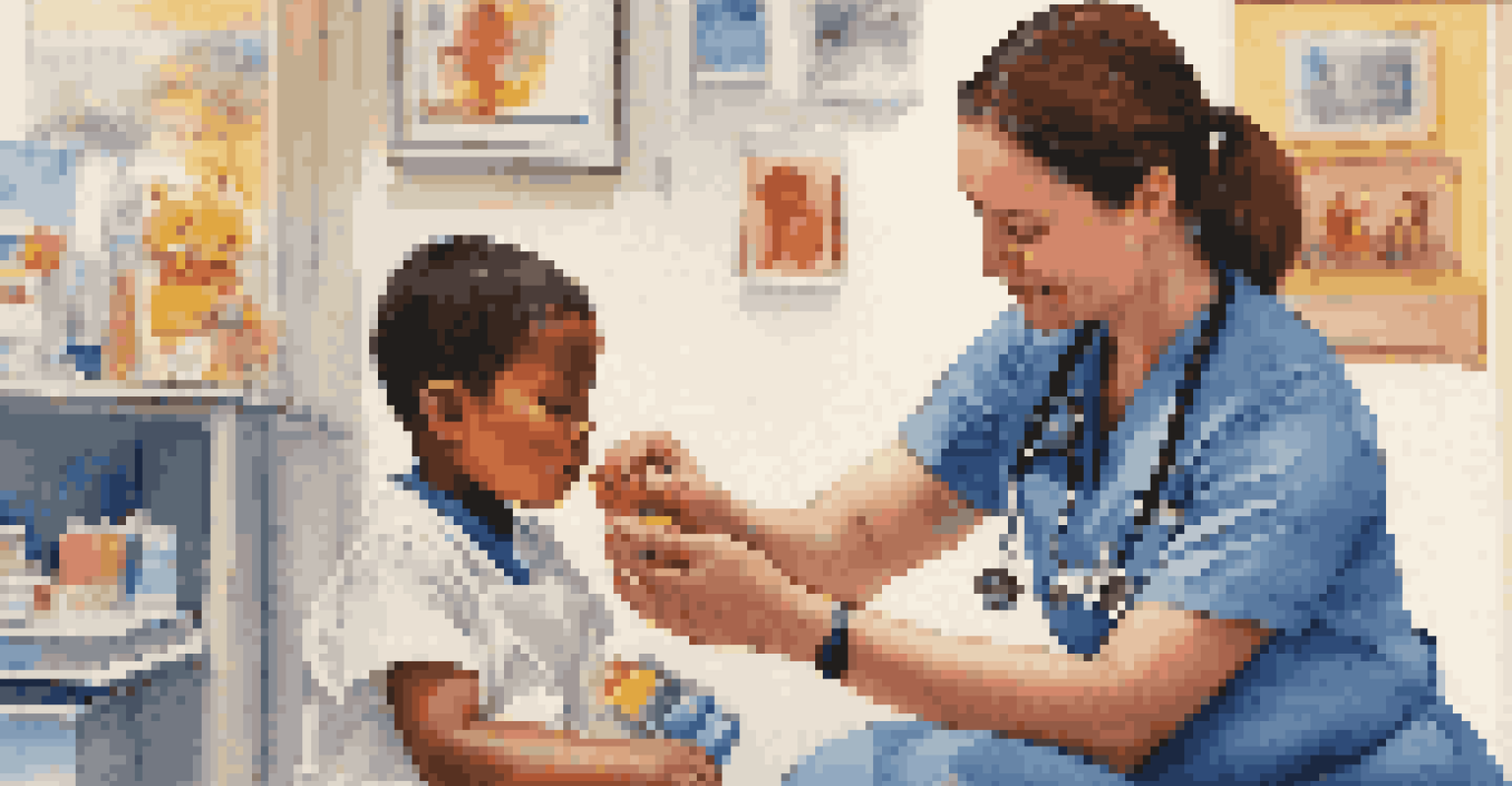The Impact of Regular Vaccination on Community Health Trends

Understanding Vaccination and Community Health
Vaccination is a vital public health tool that helps prevent the spread of infectious diseases. By introducing a harmless part of the pathogen into the body, vaccines stimulate the immune system to recognize and fight the actual disease. This not only protects individuals but also contributes to the overall health of the community, creating a collective immunity known as herd immunity.
Vaccines are the tugboats of preventive health.
When enough people are vaccinated, the spread of disease is significantly reduced, protecting those who cannot be vaccinated, such as infants or individuals with certain health conditions. This interconnectedness highlights how individual health choices influence community well-being. A well-vaccinated population helps maintain lower infection rates and reduces the healthcare burden.
Moreover, vaccination can lead to the eradication of diseases, as seen with smallpox. The success of community vaccinations showcases the importance of public participation in health initiatives, emphasizing that every shot counts in safeguarding not just personal health but also the health of the entire community.
Historical Trends in Vaccination and Health Outcomes
Looking back, the introduction of vaccines such as the polio vaccine in the 1950s drastically reduced the incidence of this debilitating disease. As more people received vaccinations, polio cases plummeted, illustrating the direct link between vaccination rates and health outcomes. This historical perspective reinforces the importance of maintaining high vaccination coverage.

In the decades since, we have witnessed similar trends with diseases like measles and mumps, which have seen significant declines due to widespread vaccination efforts. These successes serve as powerful reminders of the effectiveness of vaccines in controlling infectious diseases. Yet, recent years have shown a concerning rise in vaccine hesitancy, threatening these hard-won gains.
Vaccination Boosts Community Health
Vaccination not only protects individuals but also fosters herd immunity, safeguarding vulnerable populations.
The fluctuations in vaccination trends over time highlight the need for continuous public health education. By understanding the history of vaccination and its impact on health outcomes, communities can better appreciate the importance of ongoing vaccination efforts in preventing the resurgence of diseases.
The Role of Vaccination in Preventing Disease Outbreaks
Vaccination plays a crucial role in preventing disease outbreaks, which can have devastating effects on public health. For instance, the resurgence of measles in some areas has been linked to declining vaccination rates. This illustrates how a drop in community immunity can lead to outbreaks, affecting not only the unvaccinated but also vulnerable populations.
The greatest weapon against stress is our ability to choose one thought over another.
When a sufficient number of individuals are vaccinated, the chances of disease transmission significantly decrease. This is particularly important for diseases that can spread rapidly, like influenza. Vaccination campaigns, especially during flu season, aim to protect large segments of the population, thus reducing the likelihood of widespread outbreaks.
Moreover, timely vaccination can help mitigate the impact of emerging infectious diseases. As seen with the COVID-19 pandemic, rapid vaccine development and deployment have been critical in controlling the spread of the virus. This adaptability in vaccination strategies showcases the essential role of vaccines in safeguarding public health during crises.
Economic Benefits of Regular Vaccination
Investing in regular vaccination programs yields significant economic benefits for communities. By preventing diseases, vaccinations help reduce healthcare costs associated with treating illnesses and managing outbreaks. In fact, the CDC estimates that for every dollar spent on childhood vaccinations, approximately $3 in direct healthcare costs are saved.
Additionally, healthier populations contribute to a more productive workforce. When fewer individuals fall ill due to vaccine-preventable diseases, businesses experience less absenteeism, leading to increased economic stability. This creates a positive feedback loop where community health and economic prosperity go hand in hand.
Historical Success in Disease Control
The dramatic decline of diseases like polio and measles underscores the effectiveness of widespread vaccination efforts.
Furthermore, the cost-effectiveness of vaccination programs can help free up resources for other vital areas of public health. By prioritizing vaccinations, communities can allocate funds towards education, infrastructure, and other essential services. This holistic approach underscores the importance of viewing vaccinations as an investment in the future.
Community Engagement and Vaccine Awareness
Community engagement is pivotal in promoting vaccine awareness and acceptance. Local leaders, healthcare providers, and organizations can work together to educate the public about the benefits and safety of vaccines. By addressing concerns and misinformation, communities can foster a more informed population that values vaccination.
Social media and community events can serve as effective platforms for spreading accurate information about vaccines. Personal stories from vaccinated individuals can resonate with others, creating a sense of shared responsibility for community health. This grassroots approach can help combat vaccine hesitancy and encourage more people to get vaccinated.
Moreover, involving community members in health initiatives can lead to more tailored approaches that resonate with specific populations. By understanding cultural beliefs and practices, health professionals can design vaccination campaigns that are both respectful and effective. This collaborative effort can significantly enhance vaccination rates and improve overall public health.
Challenges to Vaccination Efforts
Despite the clear benefits of vaccinations, several challenges can hinder their effectiveness. Misinformation surrounding vaccines can create fear and hesitation among community members. This is particularly concerning in the age of social media, where misinformation can spread rapidly and influence public opinion.
Access to vaccines can also pose a significant barrier, especially in underserved communities. Factors such as transportation, cost, and availability can prevent individuals from receiving their vaccinations. Addressing these access issues is crucial in ensuring equitable vaccination coverage across all demographics.
Economic Gains from Vaccination
Investing in vaccination programs leads to reduced healthcare costs and a more productive workforce.
Additionally, healthcare systems must remain vigilant in monitoring vaccination rates and addressing any declines. Regular outreach and education efforts are essential in maintaining high vaccination levels. By identifying and tackling these challenges head-on, communities can bolster their vaccination efforts and enhance public health.
Future Directions in Vaccination and Community Health
Looking ahead, the future of vaccination and community health appears promising yet requires ongoing commitment. Innovations in vaccine development, such as mRNA technology, can lead to more effective vaccines for a broader range of diseases. These advancements highlight the importance of research and development in the field of immunization.
Additionally, continued education and community engagement will be crucial in maintaining public trust in vaccines. As new vaccines are introduced, transparent communication about their safety and efficacy will help alleviate concerns. Empowering communities with knowledge is key to fostering a culture of vaccination.

Finally, global collaboration in vaccination efforts can enhance community health beyond borders. The interconnectedness of our world means that disease outbreaks can have far-reaching effects. By working together, countries can share data, resources, and strategies to improve vaccination rates and protect public health on a global scale.